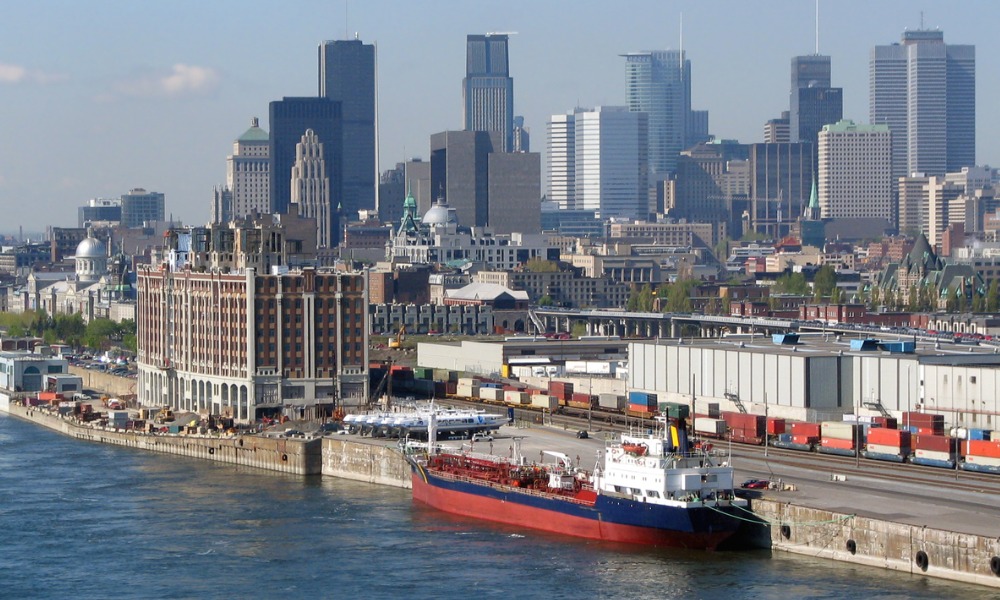
Experts warn of potential disruptions that the labour action would cause

Dockworkers at the Port of Montreal represented by the Canadian Union of Public Employees (CUPE) have launched a three-day strike, halting operations at two key terminals that together handle over 40% of container traffic at Canada’s second-largest port.
Around 350 longshore workers at Viau and Maisonneuve Termon walked off the job at 7 a.m. on Monday in the midst of ongoing contract negotiations about better working conditions and wages for workers. The strike is set to continue until Thursday morning, according to a report from The Canadian Press (CP).
The CUPE local cited issues related to regular scheduling and wage improvements as central to their demands.
Last week, following three special meetings held on Tuesday, Sept. 24, the union representing Montreal longshore workers said their members rejected the employer’s last offer (99.63%) and voted for pressure tactics up to and including strike action (97.88%).
The Maritime Employers Association (MEA) expressed disappointment about the strike, stating it had made extensive efforts to prevent the strike, including mediation and a last-minute appeal to the Canada Industrial Relations Board.
"The MEA had sincerely hoped to find common ground to maintain operations. We are thus disappointed with this outcome," said MEA spokesperson Isabelle Pelletier in the CP report posted on Global News.
However, the strike could have been avoided if the employer addressed workers’ key concerns, said union spokesperson Michel Murray. The workers’ previous contract expired at the end of December, and negotiations have been ongoing since.
Last month, more than 2,600 Quebec hotel workers went on strike to seek better deals from their employers.
According to industry experts, even short strikes at the Port of Montreal can severely disrupt Canada’s supply chains. Lisa McEwan, co-owner of Hemisphere Freight, explained that while a brief stoppage would cause immediate headaches for shippers, a protracted strike could be devastating.
“A two-day strike can wreak havoc on the importations into this country,” she said in the CP report. “When it gets really bad, ships get stuck at sea, containers don’t move, and fees pile up for importers and consumers.”
The Canadian Federation of Independent Business (CFIB) also said it is very concerned about the impact the strike at the Port of Montreal would have on small businesses.
This would be the third strike at the Port of Montreal since 2020, said the group.
“There have been too many strikes affecting our supply chains in recent years, causing delivery delays, production slowdowns and impacting small businesses' bottom line. It's simply irresponsible for the unions to take strike action yet again,” said Jasmin Guenette, vice president national affairs, CFIB.
“Unfortunately, the federal government doesn't seem particularly concerned with this new strike threat and its impact. Small businesses are very worried as they remember all too well the impact of the 2020 and 2021 strikes at the Port of Montreal and the 2023 strike at BC ports.”
She encouraged Ottawa to do something about the labour disruption.
“Canada cannot afford another strike at any port across the country. The federal government should make ports an essential service, so they remain operational at all times. Small businesses and their employees should not be subjected to the uncertainty of strikes and lockouts in the nation's supply chain infrastructure.”
Recently, a tentative agreement was reached in the Metro Vancouver grain terminal workers’ strike.
Meanwhile, Transport Minister Anita Anand called for both parties to get back to the bargaining table.
“The Port of Montreal is critical to our supply chains. Parties must return to the table and put in the work needed to get a deal done,” she said via X.
CUPE had earlier called on the federal government to “resist pressure from CEOs and their conservative allies, and not intervene in the labour dispute” at the Port of Montreal.
“It’s another textbook example of how government tampering in collective bargaining prevents labour peace, rather than enabling it,” said CUPE National President Mark Hancock. “Our message to the Trudeau government is simple: back off. Let the parties negotiate a fair deal. And don’t even think about touching our members’ Charter rights to free and fair collective bargaining.”
In August, Labour Minister Steve MacKinnon invoked Section 107 of the Canada Labour Code to impose binding arbitration on the dispute between Canadian National Railway (CN), Canadian Pacific Kansas City (CPKC) and the Teamsters union, which represents engineers, conductors, and yard workers.
After that, Prime Minister Justin Trudeau said that the decision for his government to call for binding arbitration between the union and the employers was made “reluctantly” – but it was the only logical move.